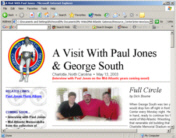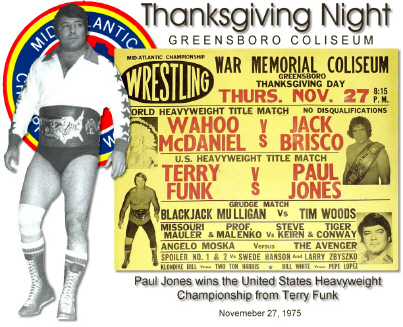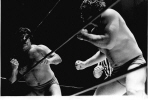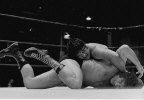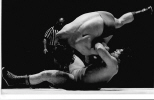|
|
||
|
Part Two
Full Circle: A Visit with Paul Jones & George South Return to the Mid-Atlantic Gateway lobby.
|
Part Two - Big Events, Big History, Big Champions
DC: Do you consider the US tournament in 1975 and the subsequent victory over Terry Funk for the US belt on Thanksgiving 1975 to be your highpoints in the Mid-Atlantic area? Those were both huge houses.
Paul: Yeah, that was big. I worked five times that night in Greensboro against some tough guys. It was a long night. And then I came back three weeks later and we sold out for the return against Terry Funk. The tournament set attendance and gate records for the city and the southeast.
DB: What do you remember about the plane crash in 1975?
Paul: I was at Bob Bruggers apartment and Jimmy Crockett and a few others were there and we're having a beer. And it was getting on up into the afternoon, and it was time for everybody to head to their show, I was going to drive to Kingstree, Bob was going to drive to Wilmington. And Jimmy told Bruggers he had decided not to go to Wilmington, that David could look after things, and Bob could have his seat on the plane, and he wouldn't have to drive, which Bob very much appreciated. And so that's how Bob wound up on that plane. So when we left Kingstree later that night, you had to go to Florence to then get to Charlotte, and we were on the way back and we hear about the plane crash on the way back. And I thought, oh my God, Bob was on that plane, too.
DC: Flair was on that plane. What were your thoughts of a young Ric Flair when he came in?
Paul: They put him with the Andersons to give him some experience. He was moving along, but his big break, you hate to say it like this, but Flair got his break after the plane crash, when he came back and Valentine had previously controlled the territory, and Flair got to shine at that point.
DC: You were in the middle of several pivotal moments in Flair's early career. Flair got his first singles title from you. Then, when Steamboat turned on you in 1978...
Paul: I'm glad you finally got that straight...
David: I catch on quickly. You had been heel for a few months, and then they turned Flair babyface, which shocked everyone, but at first it was heel vs. heel with you and Flair, and then Flair made the complete turn and teamed with Steamboat to go against you and Raschke for the tag titles. That was the biggest crowd I ever saw in Richmond.
George: There was a full color magazine cover of Paul working with Flair, and Paul's all bloody and chocking Ric and the caption is "The Night Paul Jones Made Ric Flair a Star".
Paul: Yeah, that was huge. But you know, I didn't turn on Flair, all I heard was a "Whooo" behind me and boom, the lights went out. Just like Steamboat, Flair turned on me. (laughs.)
DB: The US tournament and subsequent win over Funk we discussed earlier; that put you as the top contender for the NWA title. What NWA champions did you wrestle over your career and who were the best?
Paul: The first NWA champion I wrestled was Lou Thesz. I also wrestled Pat O'Conner, Gene Kininski, Harley Race, Dory Funk, Jr. and Terry Funk. But the greatest champion I wrestled was Jack Brisco. Most of the champions had the exact same routine night in and night out. Wrestling in the territories required that to some extent, but Brisco was different. And of course, I wrestled him many times before he was champion, in Florida. And then we had a lot of hour draws when he had the belt. But with Brisco, it was a different type of championship match. It wasn't by the numbers, it wasn't choreographed, we told a story. Every match was different. We trusted each other, we gave each other our bodies, and that made for a great match.
Photos courtesy Paul Jones / Also available through WrestlingClasscis.com / Click to Enlarge
DB: When you and Jack hooked up again here in 1982, it looked like the magic was back. Those were some great matches for the Mid-Atlantic heavyweight title. It looked like you were really enjoying working again, and Jack, too.
Paul: Absolutely.
George: And you can't put a price on that. There are times after you've been working for awhile with guys and you're just going through the motions, and then you get to work with someone you truly enjoy working with, and it's a great feeling, an exciting feeling.
Paul: Jack and I could work a match without even saying a word sometimes. We had that special communication.
Part Three - Managing and the Great American Dream © 2003 Mid-Atlantic Wrestling Gateway |
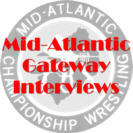
 Paul Jones
Paul Jones